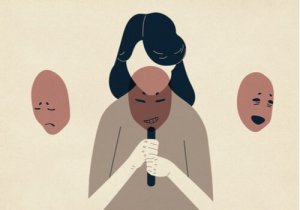What Factors Influence Our Mood?

Mood isn’t only what makes us smile or laugh out loud. Generally, it’s related to an external thing (situation, place, other people, etc.) or internal thoughts.
It refers exclusively to internal feelings, which are subjective. It doesn’t cover the external manifestation of the feelings. When we consider internal feelings and their external expression, we’re referring to showing affection, not mood.
Being in a good mood means being cheerful
We often hear people say “I’m in a good mood” or “I’m in a bad mood”. We say these things when we want to express our mindset on certain circumstances. When we’re in a good mood, our vital and sentimental senses are strengthened. Namely, we feel happy and are in harmony with all the positive events that are happening.
If we’re in a good mood, we’re optimistic and want to do things. For example, we want to connect with other people, have fun, and take advantage of our daily experiences. Likewise, we have a greater capacity for resilience to face possible obstacles. Therefore, we tend to minimize setbacks by downplaying them, due to the optimism that our good mood generates.

When we’re in a bad mood, we don’t want to be with other people
On the other hand, when we find ourselves in a bad mood, we’re pessimistic and feel apathetic. Likewise, we’re cold and lack any interest in anything that requires minimum effort.
In this sense, setbacks may seem annoying and insurmountable difficulties. However, this tends to worsen our mood even more. When we’re in a bad mood, we prefer that others leave us alone and not bother us.
What factors influence our mood?
Some factors are external and come from the surrounding environment in a person’s life. Other factors are internal and come from inside. These appear in the form of physical or mental feelings or as a combination of both.
There’s no way to properly classify the factors that influence our mood. This is because one of their basic characteristics is that they’re specific to each person. In other words, each person is sensitive to certain factors in a particular way.
Thus, the same circumstances can influence different people in different ways, according to their temperament and character. In order to test this out, we can try a simple experiment that consists of going to a social gathering and stopping to observe each of the attendees. Namely, we’re trying to perceive each person’s mindset and predominant mood. Probably, we’d see somebody who’s cheerful, radiant, talkative, and enthusiastic.
Likewise, in the same gathering, we could also observe someone who’s silent, untalkative, and absent. We could also observe a mocking, arrogant, and overconfident person who never ceases to attract attention. Lastly, we could also observe someone sitting in the corner by themselves, enjoying the music.
As we’ve seen, the gathering and the environmental stimuli are common to all. However, each person reacts in different ways. Therefore, our mood depends on what we think and do in certain situations.

Our life story determines our mood
What’s wonderful for one person can be horrifying for another. Each person is made up of a set of experiences, lessons, and memories they’ve collected throughout their lifetime. This is what we call ‘life story’.
Each of these experiences, lessons, and memories are accompanied by emotions. Those specific emotions activate when we face circumstances that evoke them.
Therefore, a specific incident in and of itself doesn’t influence our mood. What does affect it is our mental perception of it, with all the emotional burden it implies.
In conclusion, all of the things that provoke both positive and negative emotional reactions affect mood. Therefore, it’s a good idea to make a list of them so we can get to know ourselves better.
This text is provided for informational purposes only and does not replace consultation with a professional. If in doubt, consult your specialist.








